
Outgoing Governor of Kano State, Dr Rabi’u Musa Kwankwaso, has become synonymous with the new face of Kano, the old commercial capital of Northern Nigeria.
As its prosperous glorious history, Kano under the enigmatic engineer-turned-politician, has rebounded with renewed vitality, thanks to massive investment in human and critical public infrastructure.
Muhammad Nuradeen, Editor Time Nigeria Magazine, captures the unprecedented achievements of the man fondly called Kwankwasiyya.
The Kwankwasiyya and Amaana slogan literarily explain the new political ideology and philosophy enthusiastically deployed to explain the leadership trust reposed in outgoing governor of Kano State, Dr Rabiu Musa Kwankwaso.
The popular American economist and philosopher, John Kenneth Gaibraith, in one of his postulations, had declared: “All of the great leaders have had one characteristic in common: it was the willingness to confront unequivocally the major anxiety of their people in their time. This, and not much else, is the essence of leadership.”
This perhaps explains the quality of leadership in the gritty and firm Kwankwaso. What could have better describe a man order than exemplary character and purposeful leadership.
Kwakwaso also plays out the popular saying that a great leader communicates vision that captures the imagination and fires the hearts and minds of those around them. Would the people of the ancient Kano state ever forget in an hurry the achievement of the amiable outgoing Governor of Kano during his administration in the state? The answer may not be farfetched, Kano people would never forget as it will continue to linger in their memory forever.
Indeed, his administration’s achievements are monumental, and it will be an extremely difficult challenge for his successor to strive to meet or surpass them.
The Kwankwaso administration has challenged many others states to live up to the billings and deliver on their mandates.
For sure, in Nigeria, today, Kano State remains a model state not only in the northern axis of the country but also in the entire country given the uncommon transformational development in both human, material and infrastructures in the state.
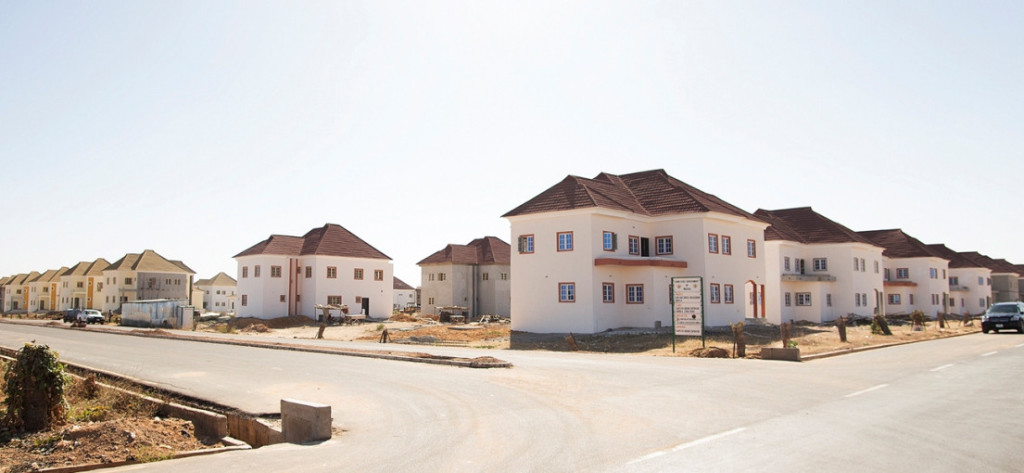
Housing Estate in Kano
The economic nerve centre of the north is presently assuming a Dubai status in Nigeria. For real, Kano State and its people have had their fair share and treatment of dividend of democracy in the hand of a trustworthy man.
The Kwakwansiyya slogan and Red cap identity definitely did not come by accident, rather it was as a result of the track of records of probity, tested and trusted leadership Kwakwanso demonstrated in his administration as its tagged Amaana in response to Kwakwansiyya. One would therefore be inquisitive to ask the meaning of Amana. A Kano man will be quick to tell you that is trust that characterised the administration of a affable humanist and administrator per excellence.
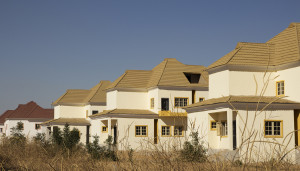
Housing Estate in Kano
At the return of democracy in 1999, Kwankwaso having been recognised as a political asset in the state during the Peoples Democratic Movement (PDM) days was dragged to contest under the People Democratic Party in 1999 and has since conceived the dream of taking the state to an enviable pedestal.
It has been a watershed in the history of the state as it started enjoying the midas touch in the life of the state. The achievement the governor of Kano recorded in his first term cannot never be underestimated.
His achievements in the areas of Education, Rural Electrification and Health have continued to be a reference point in the annals of the history of the state just in his first term as Governor of the state. His longing for academic excellence was second to none. Kwankwaso established a State University of Technology at Wudil.
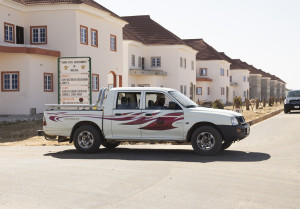
Housing Estate in Kano
With his determination to eradicate street begging, he introduced Free Feeding Programme for Primary School Students in the state to attract the attention of pupils to school and this caught the attention the United Nations which recognised his effort.
His electrification programme in the rural areas recorded a great success. He was able to give the Federal Government a property that was turned into the Nigeria Law School at Bagauda. In his drive to ensure free flow of traffic, he succeeded in building a good number of bridges in the rural areas.
To achieve a sustainable healthcare system, he introduced free natal programme for pregnant mothers, he encouraged monthly routine of immunisation programme in the state.
After losing in his re-election bid, Kwankwaso was then appointed as the Minister of Defence in President Olusegun Obasanjo‘s cabinet in 2003. In 2007, he was appointed as the Presidential Special Envoy to Somalia and Darfur by same Obasanjo administration. For the love of his people he continued to use his influence at the federal level to undermine his opponents especially the Kano State Government.
Kwankwaso was the party leader in Kano and was nominated into the party’s most powerful political circle in PDP, the Board of Trustees and was shortlisted for ambassadorial appointment by the Yar’adua administration.
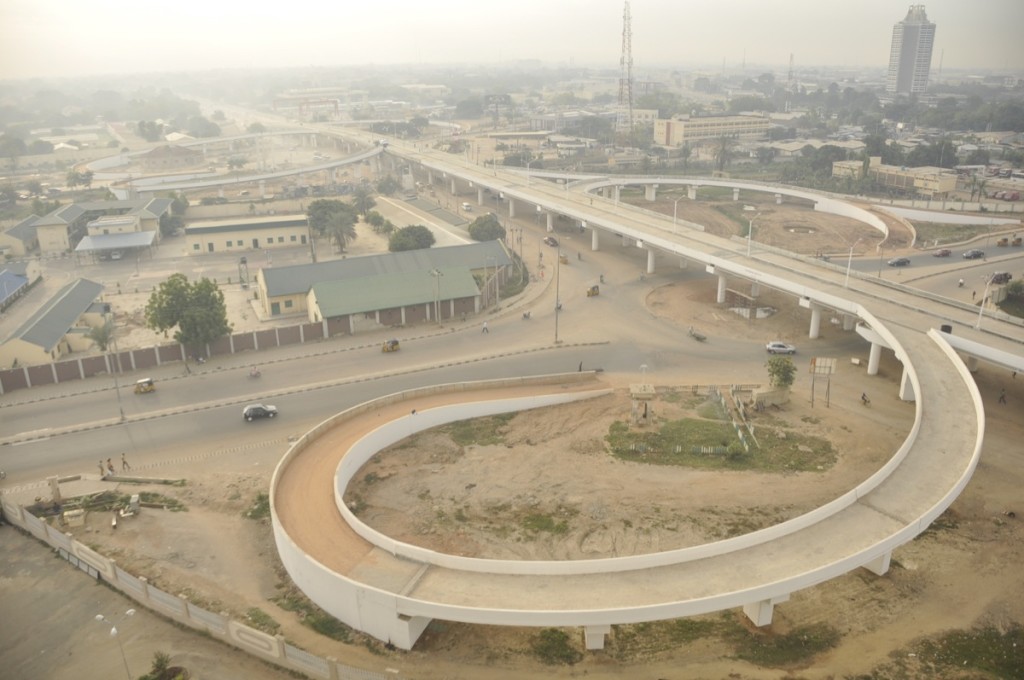
Kano flovers
But he refused to accept the ambassadorial a position, but agreed in 2009 to serve as a board member representing Northwest region of Nigeria in the Niger Delta Development Commission(NNDC).
Beckoned on by the people of the ancient state, he kept hope alive. On May 29th, 2011, the astute and a seasoned administrator took over the mantle of leadership from Alhaji Ibrahim Shekarau.
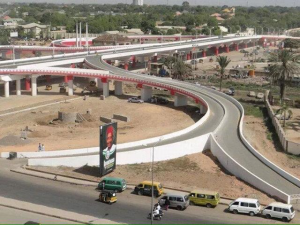
Kano Bridges
It was a remarkable turning point for the state and its people. Since then, it had been from one project to another and one programme to another. In Kano, everyday is a busy day, not because of its commercial nature, but because of government at work.
Indeed, it was another opportunity for the state to have Kwankwaso re-elected for a second term, as the man of the people won with a remarkable difference of more than 63,000 votes.
His party won three quarter of the house of assembly seats–30 out of the total 40 seats in the state.
Having experienced the nature of government expenditures and the enormous task ahead of him, Kwankwaso had designed an economic blueprint to strengthen the state Internally Generated Revenue (IGR) to match the kind of development he envisioned for the state.
Kano State was able to meet up in his expenditures inspite of the continuous dwindling revenue from Federal Account.
Kwankwaso worked assiduously to improve upon the state’s internally generated revenue as it rose from N400 million to more than N2billion a month. The Governor in his administrative acumen ensured that frivolous expenditures were checked in MDAs, saving up to N500 million monthly.
Shifting the paradigm from the old order, the government-led by Kwankwasiyya restructured the local government system to meet the need of the people of the state.
In his determination to resuscitate and clean up the ministry, he embarked on urban and rural solar powered infrastructure with the solar irrigation, training of students across 44 local governments in electrical installation, hand pump maintenance and repair of the Tige-Challawa Hydroelectricity power plants.
Under the Kano State Government Social Services initiative to end street begging, hawking and other vices in the state, the governor was quick to initiate legislations ranging from the ban on street begging to street hawking and stray animals.
As a matter of necessity he implemented policies and social reform programmes like the mass wedding programme, house numbering and street naming exercise and other empowerment initiatives anchored by the Community Reorientation Committee (CRC).
The establishment of 26 manpower development institutes like the Reformatory, Corporate Security, Sports, Hospitality and Tourism was also note worthy.
So far over 500,000 women and youth have benefitted from these programmes.
Kano State under the watchful eyes of Kwankwaso has attained another level of economic development by establishing 44 Garment Industries, one in each of the local council of the State while young entrepreneurs have access to finance. At least 37 Micro-finance Banks were also established in 37 Local Government Areas to give financial push to the cottage industries.
Government also facilitated a N6 billion soft loan scheme The State Government provided N3 billion and the Central Bank, Banks of Agriculture and Bank of Industry provided N3 billion. There was also training of 10, 000 butchers from 44 local government while 660 Kano indigenes had been trained in modern leather works and foot wear technology.
Today, Kano State stands tall among her peers in the areas of economic development. The Kwakwanso-led administration did not rest on his oars in other developmental endeavours to improve and expand on infrastructures.
The governor frontally confronted the dualisation of all major road networks and putting up security plazas on all roads leading into Kano metropolis. The governor also constructed 5km dualised road with street light in each of the 44 Local Government Areas of the State to facilitate smooth movement from the nooks and crannies of the state.
There is also the construction of three flyovers, all of which have been commissioned. This is in addition to underpasses and overhead pedestrian bridges at different locations of the city. Some old city gates were reconstructed to meet the 21st century standards, another 3 new modern cities namely Kwankwasiyya, Amana and Bandirawo was also established.
As part of his campaign promises, Kwankwasiyya laid about 200km of 400 – 1000 D.I pipes to ensure enough water supply to the State.
The 35mw Independent Power Project at Challawa-Gorge and Tiga Dams were constructed to meet the power needs of the people of the state. It is not an overstatement to state that today Kano is adjudged to be the most lit state in Nigeria. A visit to Kano will confirm this!
Kano people prayed for a visionary leader that will give a purposeful direction to revive the state from it moribund status. The people of Kano are also living witnesses to all development going on and on in the state.
Kwankwasiyya administration has achieved remarkable feats in the area of education where it established the University of Science and Technology Wudil in it first tenure in 2001 and the North West University in second term in 2012. Only Kano State followed by Katsina State have achieved this feat in the history of the country to spring up two universities within a span of ten years.
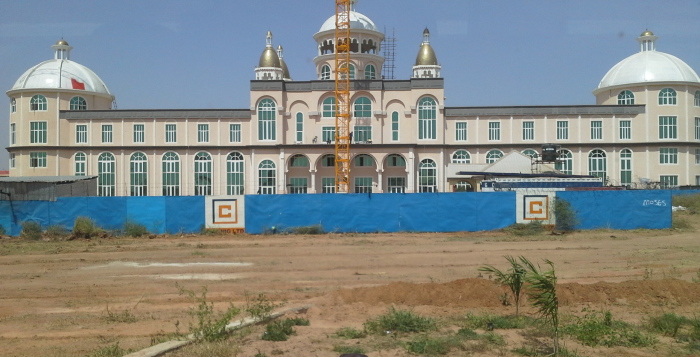
North-West University Kano
Kwankwaso administration was able to construct a main campus and other faculties including a Medical College for the new University, converted most of abandoned public buildings into model secondary schools, which includes Governor’s College, Janbaki Girls College and First Lady College.
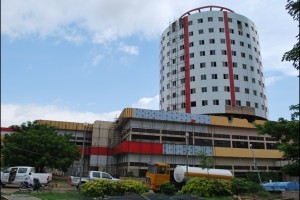
First Lady College
The government also re-introduced Boarding Primary School along with 2 Bi-lingual Colleges in Niamey and Damagaran in Niger Republic.
It is remarkable to say that such development has succeeded in raising the bar of school enrolment from one to more than 3million, backing it up with facilities, Kwankwaso-led administration constructed and furnished over 3000 classrooms and completed 1000 abandoned classes.
In Kano State it is all-round development as Kwankwaso did not leave any stone unturned in achieving excellence in the state.
He equipped 300 science school laboratories and 100 libraries and computer rooms. The administration’s concerted effort towards encouraging Kano people to acquire education was what led Kwankwaso government to declare free education at all levels from primary to tertiary.
The government was also able to sponsor close to 3000 postgraduate and undergraduate students to study in 14 countries around the world. Today, Kano State has the largest government sponsored educational development programme in the country.
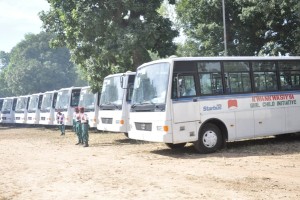
Kano Buses, in support of Girl-child Education
On this note, it is expected that in the nearest future the tendency of Kano indigenes to dominate strategic position in human resources in the country may not be an accident. The construction of staff complex library, and administrative block at College of Arts, Science and Remedial Studies, Kano, the recruitment of expatriate teachers for North-West University (NWU), KUST with a Professor and Senior lecturers, sponsorship of Kano indigenes at Igbinedion University, Okada, are all too evident.
A good percentage of the students have already graduated with excellent results. Kano State has also been able to bring about a positive attitudinal change in her people, as the young men and women now hold jobs that were considered menial.
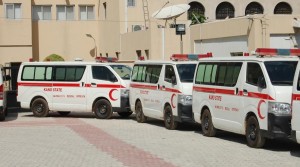
Kano Ambulance
Kwankwasiyya administration is not leaving any stone unturned as his transformation achievement cut across the ministries of state government, ranging from Justice, Special Duties, Monitoring and Evaluation, Women Affairs, Finance, Commerce, Water Resources, Rural and Community Development, Planning and Budgeting , Environment, Information, Agriculture and Natural Resources, Science and Technology, Health, Education, Higher Education, Head of Service, Commissioner of State Affairs up to the Office of Secretary to the State Government. No one is left out of various development that have placed Kano State at a higher pedestal under the purposeful leadership of Kwankwaso.
The Kwankwasiyya administration has continued to strive to consolidate on these achievements and the government has appealed to the traditional institution to cooperate with it in fulfilling its pact with the people.







